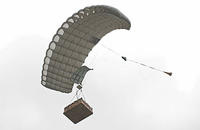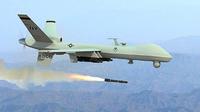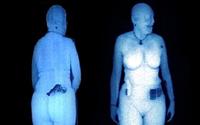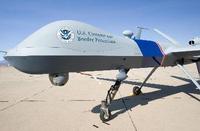-
Precision parachute system for pin-point delivery of sensitive loads

Military units often operate behind enemy lines, and disasters often sever transportation links; in both cases, the provision of supplies — military or humanitarian — is a major issue; now there is a solution; the manufacturer says that the precision air-cargo parachute — classified as a UAV becasue of its navigation capabilities — is the only commercially available system in the world that can ensure the pin-point delivery of sensitive mission equipment, humanitarian aid, and supplies fully automatically from the air without damage
-
-
Ex-CIA head praises drone warfare

More than forty people were killed in Pakistan last week in a U.S. drone attack near the Afghan border; despite the controversial use of drones, ex-CIA director Michael Hayden says they are winning the war; ten years after 9/11, al Qaeda’s leadership no longer enjoys sanctuary in the tribal areas of Pakistan where for many years, it has been able to plot and train its recruits
-
-
Innovative decontamination cloth reaches market
A new decontamination cloth, developed for use by soldiers and first responders, is now available in several forms — as preshaped mitts for personal wipedowns if someone is exposed to toxins or chemicals, individual wipe cloths and pads, and in rolls perforated to produces 12-inch by 12-inch sheets, like paper towels in a kitchen
-
-
Jails turning to full body scanners

Cook County Jail in Chicago recently installed four full-body scanners to help improve security; officials say that the body scanners have enabled officers to better detect contraband items, hidden away in body cavities, and reduced the need for strip searches; the machines are located in the jail’s two maximum security areas as well as the initial processing area; officials say they plan to begin using body scanners at the Cook County courthouse to scan detainees before they enter the courtroom
-
-
Westland, MI firefighters receive federal grant for fitness program
Westland, Michigan firefighters recently received more than $100,000 from the federal government to fund a new wellness program; the health program is designed to help prevent on the job heart attacks, which is one of the primary causes of death among firefighters; roughly 100 firefighters die on the job each year, and heart attacks are responsible for 45 percent of those deaths, a higher percentage than other public safety occupations; Westland firefighters have also received $14,800 to upgrade its radio systems to comply with state-mandated standards
-
-
U.S. UAVs track drug gangs in Mexico

The war in Mexico — between the drug cartels and the government, and among the drug cartels themselves — has been increasingly spilling across the border into the United States; some cartels now maintain outposts in the Arizona desert; to gather more information about the cartels, and to help the Mexican authorities in their war against them, the United States has been flying unarmed surveillance UAVs over Mexico; the flights are made in coordination with and at the request of the Mexican government; the Mexican authorities also choose the target of drone surveillance; drones had gathered intelligence that led to the arrest in Mexico of several suspects in connection with the murder of a U.S. immigration agent, Jaime Zapata
-
-
NYPD's combat vessel will thwart Mumbai-like attacks
To prevent a Mumbai-like attack in New York, the NYPD will be getting a high-speed combat vessel; the 71-foot craft, which can hit speeds of 40 knots and will be able to carry up to thirty police officers fully armed with heavy weapons; the high-speed boat will be outfitted with radiation detection equipment and infrared cameras, as well as a satellite communication facilities
-
-
Marines integrate biometrics on battlefield
The U.S. Marine Corps is beginning to implement biometric technologies to help them identify insurgents on the battlefield; members of the III Marine Expeditionary Force in Japan are undergoing training to learn how to gather biometric data; in particular, troops are looking for fingerprints from improvised explosive devices (IEDs) to help capture bomb makers; the prints are stored in a database that will soon be shared with DHS border agents to assist with counter-terrorism efforts within the United States; border agents will be able to determine if people entering the country match any of the insurgents identified abroad
-
-
Police departments relying more on volunteers
As police departments across the country face shrinking budgets, many have turned to volunteers as a way to continue providing needed services; more and more departments have begun to rely on trained volunteers to complete a variety of tasks like collecting evidence, interviewing witnesses, and investigating old cases; critics say that volunteers conducting investigations is a legal problem as they are not trained officers and could potentially jeopardize a trial, in addition to lacking accountability; supporters of the programs say that volunteers are screened, undergo thorough training, and are often supervised by officer
-
-
Verbal methods of deception detection more useful than nonverbal methods

Trapping a liar is not always easy; lies are often embedded in truths and behavioral differences between liars and truth-tellers are usually very small; in addition, some people are just very good at lying; researchers suggest that verbal methods of deception detection are more useful than nonverbal methods commonly believed to be effective, and that there are psychological differences between liars and truth-tellers that can be exploited in the search for the truth
-
-
Japan facing a nuclear catastrophe

Initial estimates say that the Magnitude 9.0 earthquake and tsunami killed about 10,000 people and made hundreds of thousands homeless; Japan is facing another threat: radioactive contamination from four damaged nuclear power plants; the tremor damaged the cooling systems in the reactors, forcing the companies operating the plants to flood the reactors with corrosive sea water and boric acid; one containment vessel was destroyed in an explosion, and in order to prevent more explosion, radioactive-contaminated hydrogen had to be released, increasing the radioactive levels to unsafe levels; more than 200,000 people living in the vicinity of the reactors were evacuated; the government has began distributing iodine pills to citizens (the pills are used to protect the thyroid gland from the effects of radiation); the difficulties at the nuclear power plants mean that rotating power outages will be imposed across Japan as of Monday
-
-
Florida's effective DNA database
Police in Palm Bay, Florida, four years ago started a local DNA database as a quicker alternative to the state’s backlogged crime labs; the average wait to get results now is fifty-seven days, as opposed to the six- to 12-month turnaround from the Florida Department of Law Enforcement — which processes most state agencies’ samples; the kits used by Palm Bay also cost $100, compared to the $800 for DNA analysis charged by other state-approved labs
-
-
Detecting invisible threats to first responders, soldiers
There are many methods currently being used that can detect chemical and biological agents and explosive compounds, but none allows for the unique fingerprinting of threat agents at trace levels; researchers have overcome this limitation with surface enhanced Raman scattering (SERS) using optically stimulated plasmon oscillations in nanostructured substrates; SERS offers several potential advantages over other spectroscopic techniques because of its measurement speed, high sensitivity, portability, and simple maneuverability
-
-
Army to request proposals for biological agent detection system
The Army is set to begin requesting proposals for the initial phase of its Joint Biological Standoff Detection System Increment 2 (JBSDS 2) program at the end of March; the program’s objective is to procure fully functional biological detection systems; JBSDS 2 is designed to provide devices capable of detecting, tracking, and identifying biological warfare clouds; the program specifies that the devices should be capable of identifying any biological agent, organism, or poison that is capable of killing, incapacitating, or impeding a large force
-
-
Army signs deal with ChemImage for explosive detection technology
The U.S. Army’s Space and Missile Defense command recently signed a $17 million contract with ChemImage Corporation to implement its real-time sensor technology to detect explosive threats in the field; ChemImage’s technology would give U.S. troops the ability to identify objects from a distance to determine if they are explosive, chemical, or biological threats; the devices rely on molecular spectroscopy and digital imaging to analyze material
-
More headlines
The long view
Why Was Pacific Northwest Home to So Many Serial Killers?
By Jacob Sweet
Ted Bundy, Gary Ridgway, George Russell, Israel Keyes, and Robert Lee Yates were serial killers who grew up in the Pacific Northwest in the shadow of smelters which spewed plumes of lead, arsenic, and cadmium into the air. As a young man, Charles Manson spent ten years at a nearby prison, where lead has seeped into the soil. The idea of a correlation between early exposure to lead and higher crime rates is not new. Fraser doesn’t explicitly support the lead-crime hypothesis, but in a nimble, haunting narrative, she argues that the connections between an unfettered pollution and violent crime warrant scrutiny.
Bookshelf: Smartphones Shape War in Hyperconnected World
By Kathryn Brimblecombe-Fox
The smartphone is helping to shape the conduct and representation of contemporary war. A new book argues that as an operative device, the smartphone is now “being used as a central weapon of war.”
